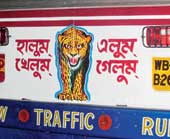 |
| A tiger’s take on “veni vidi vici”. The spirit may match but the consequence expectedly differs from Caesar’s pronouncement. One conquered, this one consumes. (Below) A cab with a difference that has a meter running for amour, not miles. Don’t complain about philandering, though. Pictures by Sudeshna Banerjee |
 |
The water in Calcutta is unfit for consumption,” says an online instruction manual for French visitors in the city. Designed by Calcutta Accueil, a voluntary forum formed by a group of French women, the “dos and don’ts” aim to help compatriots tackle the “trying conditions” of Calcutta better.
The instructions in the manual are meticulous: “Wash hands as often as possible; do not walk barefoot; disinfect floors regularly; ask for filtered water to wash vegetables or use potassium permanganate.”
“Usually we have a branch of the Accueil (which is the French for ‘to welcome’) with the French mission office in every city. But visitors to Calcutta need more help than elsewhere as there aren’t too many handbooks containing basic information about the city. So we have come up with the online guide too,” said Christiane Rysto, the founder of the city chapter.
Christiane — the wife of Jean-Louis Rysto, the French consul-general in Calcutta — launched Calcutta Accueil in October 2008 with around 20 members.
Heidi Clouet, its president, who meets her Accueil colleagues once a month over coffee, admits the most important function of the support group is to issue appropriate early warnings to newcomers.
“We help visitors with relevant tips to help them adjust to the city better,” she adds. Her fellow member Julie Das chips: “Calcutta is not a very easy city to land in and get started and any degree of handholding during the difficult first phase is welcome.”
But she is quick to add: “The people here are wonderfully warm and inclusive and this is a place that grows on you if you give it time.”
The website also provides basic information on international school, hospitals, doctors one can contact in an emergency, shopping areas and places of interest. It also provides tips on house-hunting for those staying on.
The warning bells can always be heard, the loudest, predictably, on health issues. Sample these: “Refuse any intervention, and treatment with injections, incision or endoscopically without new equipment, or sterilised as appropriate.”
Or “the control is very strict at the international airport in Calcutta. In case of fever, it is best not to travel. You might be directed to a state hospital whose standards are not like those of our healthcare institutions.”
Regional Wiki
Wikipedia may be one of the most popular websites in the world, but few know that it can be accessed in 270 languages, including 20 Indian ones.
Wiki Bangla has been around since January 2004, but with little awareness about its existence there have been few contributors. A workshop and brainstorming session was organised by NGO Sanhita along with Wikimedia Foundation at the Seagull Arts and Media Resource Centre recently to introduce Bangla Wiki to academicians and NGOS and invite contributions on women’s right and gender-related issues.
“The Bengali section of Wikipedia has hardly any information on women rights and laws. If we can enrich this section it will benefit many women in rural areas, especially those who are not conversant in English,” said Soma Sengupta, the director of Sanhita.
Women’s rights activist Vishakha Dutta represented the Wikimedia Foundation. Professors of women studies departments of various colleges were encouraged to select students who can contribute for this section. Some of the participating colleges included Sreerampur Girls’ College, Basanti Devi College, Jaiprakash Institute, Lady Brabourne College and Shibnath Shastri College.
(Contributed by Subhro Saha and Chandreyee Ghose)










